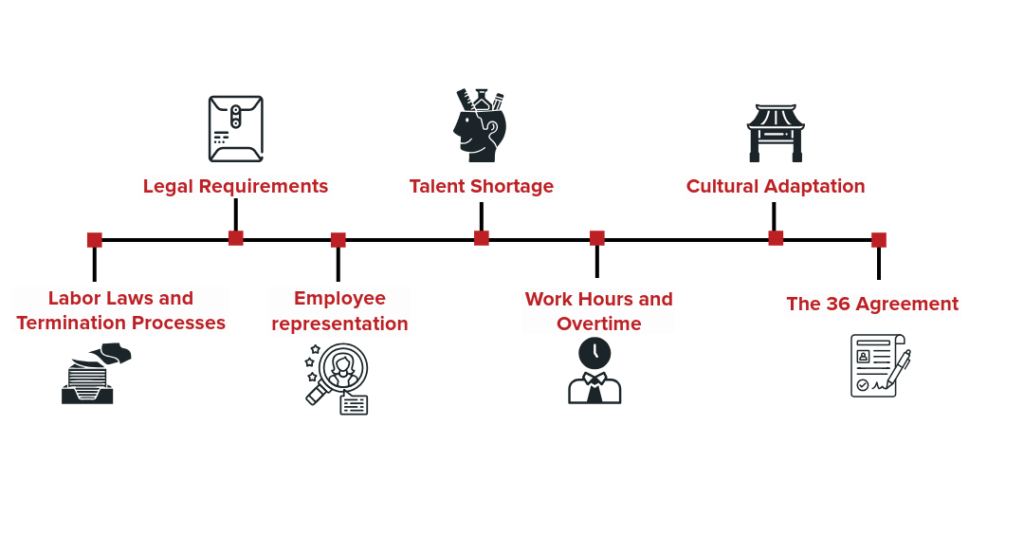Continuing our series with our partners at reesmarxGlobal, our next country of focus is Japan. Expanding into Japan presents unique challenges for businesses, particularly in the areas of labor laws, talent acquisition, and cultural adaptation. While Japan offers numerous opportunities in high-demand sectors such as IT, manufacturing, and engineering, the country’s business environment is shaped by strong legal frameworks and cultural norms that companies must navigate carefully. In this blog, we’ll explore the recruitment and employment landscape in Japan, outlining the key challenges businesses face and offering insights into how companies can thrive in this dynamic and competitive market.

Labor Laws & Termination Processes
Japan’s labor laws are rigorous and heavily favor employee protection. Employers need to be aware of the complexities involved in hiring, managing, and terminating employees, as failure to comply with legal requirements can lead to legal disputes and costly repercussions.
A major aspect of Japan’s labor law is the termination process. Japanese law requires employers to provide 30 days’ notice or payment in lieu of notice before dismissing an employee. Moreover, any termination must be based on objectively reasonable grounds. Whether due to performance issues, misconduct, or economic necessity, employers must have clear documentation to justify the termination. If a dismissal is deemed unjust or lacking a solid reason, the employee may be reinstated, and the employer could face significant legal consequences, including compensation claims.
In addition to strict dismissal regulations, businesses must be aware that unilateral termination—where an employer fires an employee without a valid reason—is illegal. This makes managing employment contracts and employee performance more critical than in other markets. Given these complexities, companies must be meticulous about their hiring practices, employee evaluations, and any potential terminations to avoid legal challenges.
"Japanese law requires employers to provide 30 days' notice or payment in lieu of notice before dismissing an employee."
Talent Shortage
Japan is currently grappling with a significant talent shortage, particularly in technical and engineering roles. This shortage is a result of Japan’s aging population and declining birth rates, which have led to a shrinking workforce. According to a 2022 survey, 76% of technology hiring managers reported that recruitment is highly competitive, with 25% citing a shortage of skilled candidates as a major challenge.
As businesses look to expand in Japan, they must recognize that the demand for talent—especially in specialized fields like IT, engineering, and manufacturing—far exceeds the supply. For companies entering the Japanese market, this means that attracting qualified candidates requires strategic approaches, including leveraging global talent pools, offering competitive compensation packages, and building relationships with local educational institutions to develop future talent.
Cultural Adaptation: Understanding Japan's Work Culture
Japan’s work culture is deeply rooted in its core values of harmony and respect. These principles shape everything from communication styles to decision-making processes in the workplace. Understanding these cultural nuances is essential for businesses seeking to build strong relationships with Japanese employees and partners.
Japanese employees are often highly detail-oriented, dedicated, and loyal to their employers. However, they also value a harmonious work environment, where clear communication and mutual respect are key. This means that businesses must be sensitive to the dynamics of hierarchical structures, group decision-making, and consensus-building when managing teams in Japan.
Furthermore, while the younger generation of Japanese employees may have more flexible career expectations than their predecessors, many workers still value long-term job stability. This is reflected in the lifetime employment system, which has traditionally been prevalent in Japan, where employees often remain with one employer throughout their careers. As a result, companies must tailor their recruitment and retention strategies to align with these cultural values.

Legal Requirements & Employee Representation
An important legal consideration for businesses operating in Japan is the requirement for an employee representative when it is implementing certain labor policies or changes that require employee consultation or agreement. The employee representative elected must be a non-managerial employee who acts as a liaison between the company and its staff, representing the opinions and concerns of employees to management.
The employee representative plays a key role in ensuring that a company’s work rules and HR policies comply with legal standards. For a company with a headcount of more than 10 employees, these policies must be submitted to the labor office along with the employee representative’s opinion letter for record-keeping. For businesses expanding into Japan, understanding the structure and role of employee representatives is crucial to maintaining compliance with labor laws and fostering a positive relationship with the workforce.
Work Hours, Overtime, & the 36 Agreement
In Japan, work hours and overtime are heavily regulated. The law mandates that employers must track employees’ working hours, and any overtime work must be compensated according to the terms agreed upon with the employee. This agreement is formalized in what is known as the 36 Agreement—a specific arrangement between the employer and the employee representative that outlines the terms of overtime work.
Employers must register this agreement with the Labor Office to remain compliant with labor laws. Additionally, Japan enforces strict rules regarding overtime compensation, and companies must ensure that they track hours meticulously and remunerate employees appropriately for any overtime worked.
Failure to comply with overtime regulations, including not executing the 36 Agreement or failing to pay overtime wages properly, can lead to legal penalties, damage to the company’s reputation, and potential labor disputes.
How we Help Clients Succeed in Japan
For businesses like reesmarxGLOBAL, helping clients succeed in Japan requires a deep understanding of both local regulations and cultural expectations. reesmarxGLOBAL focuses on sectors such as IT, manufacturing, and niche industries, where the demand for skilled talent is high, but the competition is fierce. By offering expertise in recruitment strategy, compliance with Japan’s stringent labor laws, and cultural nuances, reesmarxGLOBAL helps businesses navigate the complexities of the Japanese labor market.
With Japan’s talent shortage, adapting to local expectations and labor laws is key to building a competitive and compliant workforce. By tailoring recruitment strategies to meet local demands and offering guidance on legal and cultural aspects, reesmarxGLOBAL ensures that businesses can thrive in Japan’s competitive economy.
How HSP Group Helps Clients Succeed in Japan
HSP Group can help you navigate the complex regulatory environment in Japan. Their expert-led managed services and technical consulting were designed to help you expand with ease. Backed by GateWay, their pioneering global expansion management (GXM) system, they bring an unparalleled focus on the customer experience. By unifying everything you need for cross-border success on a single platform, you can effortlessly and compliantly manage your international footprint.
Conclusion
Japan presents both significant opportunities and challenges for businesses looking to expand. From labor laws and termination processes to the talent shortage and employee expectations, companies must be prepared to navigate a unique regulatory and cultural environment. Understanding Japan’s complex legal framework, adapting to its work culture, and offering attractive employee benefits are crucial for long-term success.
With the right support and strategic approach, businesses can overcome the challenges of Japan’s labor market and build strong, compliant teams that meet the demands of this dynamic economy. For companies looking to expand into Japan, leveraging the expertise of recruitment firms like reesmarxGLOBAL ensures a smooth and successful entry into this competitive market.
Stay tuned for the next installment in our series, where we will explore recruitment challenges in another global market.
The HSP Group & reesmarxGLOBAL partnership
HSP Group and reesmarxGLOBAL have established a strong partnership, effectively supporting clients in their expansion into new regions. HSP Group specializes in employment, HR, and payroll management, while reesmarxGLOBAL focuses on talent acquisition and headhunting. The synergy between recruitment firms and employment solution providers is often overlooked, yet it is crucial for several reasons.
One significant advantage is the enhanced transparency in processes and communication. As clients venture into unfamiliar territories, they may not know the right questions to ask or the obstacles they might face. By collaborating closely, these two types of firms can proactively identify potential challenges and opportunities, ensuring a smoother transition and a more informed approach long before clients arrive in their new markets.






